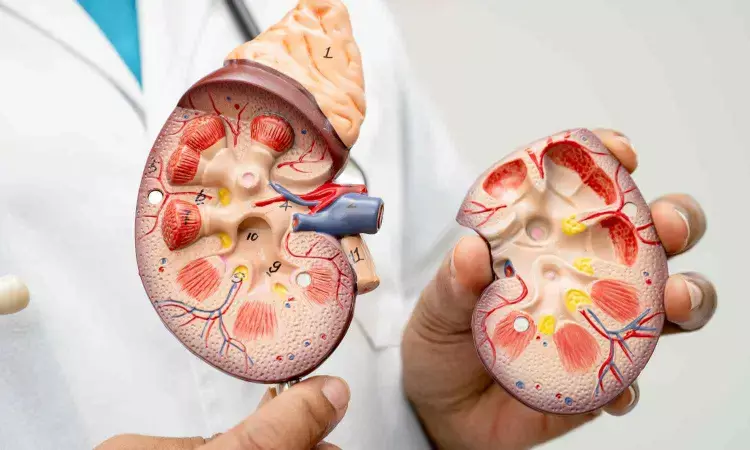- Home
- Medical news & Guidelines
- Anesthesiology
- Cardiology and CTVS
- Critical Care
- Dentistry
- Dermatology
- Diabetes and Endocrinology
- ENT
- Gastroenterology
- Medicine
- Nephrology
- Neurology
- Obstretics-Gynaecology
- Oncology
- Ophthalmology
- Orthopaedics
- Pediatrics-Neonatology
- Psychiatry
- Pulmonology
- Radiology
- Surgery
- Urology
- Laboratory Medicine
- Diet
- Nursing
- Paramedical
- Physiotherapy
- Health news
- Fact Check
- Bone Health Fact Check
- Brain Health Fact Check
- Cancer Related Fact Check
- Child Care Fact Check
- Dental and oral health fact check
- Diabetes and metabolic health fact check
- Diet and Nutrition Fact Check
- Eye and ENT Care Fact Check
- Fitness fact check
- Gut health fact check
- Heart health fact check
- Kidney health fact check
- Medical education fact check
- Men's health fact check
- Respiratory fact check
- Skin and hair care fact check
- Vaccine and Immunization fact check
- Women's health fact check
- AYUSH
- State News
- Andaman and Nicobar Islands
- Andhra Pradesh
- Arunachal Pradesh
- Assam
- Bihar
- Chandigarh
- Chattisgarh
- Dadra and Nagar Haveli
- Daman and Diu
- Delhi
- Goa
- Gujarat
- Haryana
- Himachal Pradesh
- Jammu & Kashmir
- Jharkhand
- Karnataka
- Kerala
- Ladakh
- Lakshadweep
- Madhya Pradesh
- Maharashtra
- Manipur
- Meghalaya
- Mizoram
- Nagaland
- Odisha
- Puducherry
- Punjab
- Rajasthan
- Sikkim
- Tamil Nadu
- Telangana
- Tripura
- Uttar Pradesh
- Uttrakhand
- West Bengal
- Medical Education
- Industry
New targets for diabetic kidney disease could prevent end stage kidney failure, suggests study

New potential therapeutic targets have been identified for diabetic kidney disease (DKD) - the leading cause of kidney failure in the world - that could see patients treated with new gene and drug therapies preventing the disease’s progression into end stage kidney failure. The study is published in Nature Communications.
The University of Bristol-led breakthrough, involving scientists from the UK, Europe and USA, discovered specific cell changes in the kidney caused by insulin resistance – a major driver of diabetic kidney disease.
Despite its prevalence, the molecular mechanisms underlying DKD development remain poorly understood. Researchers sought to understand the cellular and molecular changes occurring in the kidney (specifically the glomerulus and proximal tubule) which is key to understanding the mechanisms underlying the disease, identifying therapeutic targets and biomarker candidates.
Building on the team’s previous work in this area, the team examined the changes caused by insulin-resistance in four types of kidney cells, and then compared these changes with kidney biopsies from patients with early and late diabetic kidney disease.
The study revealed multiple ‘common’ and ‘cell specific’ changes caused by insulin-resistance representing new targets for pharmacological or targeted gene therapy approaches.
Richard Coward, Professor of Renal Medicine at the University of Bristol and Consultant Paediatric Nephrologist at Bristol Royal Hospital for Children, and one of the study's lead authors said: “Diabetic kidney disease is the leading cause of end-stage kidney failure in the world, occurring in up to 50 per cent of individuals with diabetes. Patients with end stage kidney disease require daily dialysis or a kidney transplant to survive. If we can find a way to prevent this, it would save and improve countless lives.
“Our aim now is to take several of these therapeutic targets forward in a pre-clinical setting, and hopefully through clinical trials.”
Dr Aisling McMahon, Executive Director of Research at Kidney Research UK, added: “We are determined to find ways to tackle diabetic kidney disease. By providing detailed information on genes and pathways involved in diabetic kidney disease, Professor Coward's work takes us one step closer to a more complete understanding of this condition, but also towards discovering new targeted agents to prevent it.”
Reference:
Abigail C. Lay et al, Profiling of insulin-resistant kidney models and human biopsies reveals common and cell-type-specific mechanisms underpinning Diabetic Kidney Disease, Nature Communications (2024). DOI: 10.1038/s41467-024-54089-1
Dr Kamal Kant Kohli-MBBS, DTCD- a chest specialist with more than 30 years of practice and a flair for writing clinical articles, Dr Kamal Kant Kohli joined Medical Dialogues as a Chief Editor of Medical News. Besides writing articles, as an editor, he proofreads and verifies all the medical content published on Medical Dialogues including those coming from journals, studies,medical conferences,guidelines etc. Email: drkohli@medicaldialogues.in. Contact no. 011-43720751


